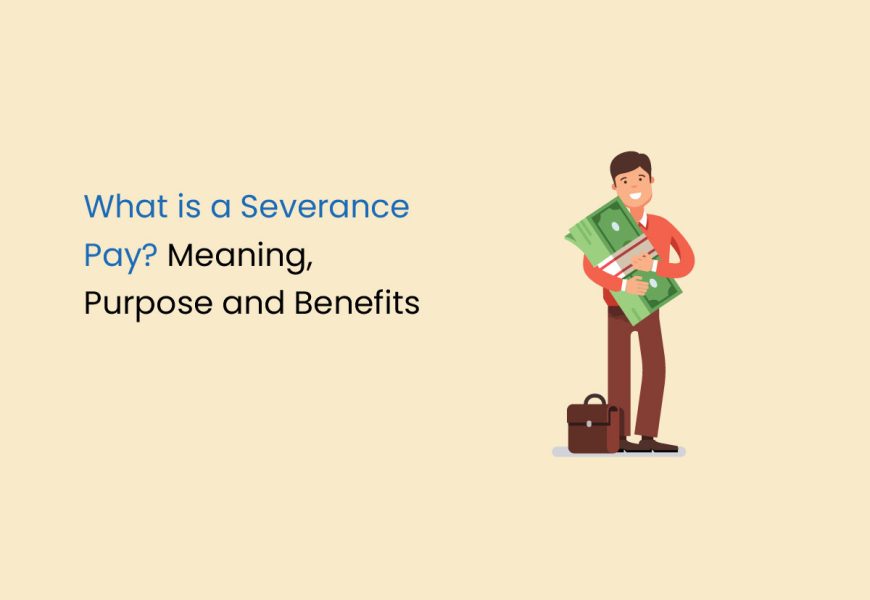The term “severance pay” carries significant weight. But what exactly does it entail? Whether you’re an employee facing an unexpected termination or an employer navigating the intricacies of workforce management, understanding the concept of severance pay is crucial.
This article would demystify severance pay by delving into its meaning, purpose, and implications. We’ll explore the financial support it provides to employees during job loss, its role in recognising contributions, and the factors that influence its terms.
What is Severance Pay?
Severance pay encompasses the compensation and benefits that an employer offers to an employee upon termination of employment. These packages often include extended benefits such as health insurance coverage and outplacement assistance to help the employee secure new employment opportunities.
Employers typically provide severance packages to employees who are laid off due to organisational downsizing, job eliminations, or retirement. In some cases, even employees who resign or are terminated may receive severance benefits.
Beyond its financial aspect, severance pay often serves as a gesture of goodwill from the employer, providing the employee with a transitional period between active employment and unemployment. This buffer can offer valuable support to individuals during times of transition in their professional lives.
Severance packages often encompass various components designed to support employees during the transition period following termination. These components may include:
- Lump Sum Payment: This entails a one-time payment provided to the employee shortly after termination. The amount is typically determined based on factors such as the employee’s salary, length of service, and company policies regarding severance.
- Continuation of Benefits: Some severance packages extend benefits beyond termination, such as continued health insurance coverage, retirement benefits, or other perks. This helps employees maintain essential benefits until they secure new employment or alternative coverage.
- Outplacement Services: Companies may offer outplacement assistance to terminated employees, providing resources like career counselling, job search support, resume writing assistance, and access to job placement services. These services aim to facilitate the employee’s transition to new employment opportunities.
- Non-Disclosure and Non-Compete Agreements: Employers may request terminated employees to sign agreements prohibiting them from disclosing sensitive company information or working for competitors for a specified duration post-termination. These agreements aim to protect the company’s interests and intellectual property.
It’s important to note that severance pay is not universally mandated by law, and entitlements can vary significantly depending on the jurisdiction and employment contracts. Both employers and employees should familiarise themselves with local labour laws and contractual agreements to understand their rights and obligations concerning severance pay.
Severance and Unemployment Benefits
Severance pay can impact unemployment compensation in various ways, depending on how it is structured and the agreements made between the employer and employee.
If an employer provides severance pay in a lump sum, the employee can typically apply for unemployment insurance right away since they are no longer on the company’s payroll. However, if severance pay is issued over several months or if the employee has unused vacation time, they may still be considered on the payroll and, therefore, ineligible for unemployment benefits during that period.
It’s essential to note that the laws governing unemployment and severance pay can differ from state to state. Therefore, individuals should consult their local employment office to understand the specific regulations and requirements for applying for unemployment benefits.
In some cases, the terms of the severance agreement may impact unemployment compensation. For instance, employees may be required to sign statements stating that they voluntarily resigned from their positions in exchange for receiving severance packages. Such agreements may disqualify them from claiming unemployment insurance, which is typically reserved for individuals who are involuntarily dismissed from their jobs.
Before signing any severance agreements, individuals should carefully review the terms and seek legal advice if necessary. It’s possible to negotiate or amend the terms of the severance package to ensure it aligns with their needs and entitlements.
Example of Severance Pay
In this example, Company A, a technology company, acquires Small Company B in California as part of its expansion efforts. However, Company A determined that one division at Small Company B was redundant and decided to lay off all 10 employees in that division.
To support the affected employees during this transition, Company A offers severance pay. The severance package consists of one month’s salary for every year that an employee has worked at Small Company B. For instance, an employee who has been with the company for five years will receive five months’ severance pay.
This severance pay serves as financial assistance to help the employees navigate their job loss and transition to new opportunities. It provides them with a buffer as they seek new employment and adjust to the changes resulting from the acquisition and restructuring process.
How To Ask for Severance Pay?
Asking for severance pay in India involves several steps to ensure clarity and adherence to relevant laws and company policies. Here’s a guide on how employees can request severance pay:
- Review Employment Contract: Review your employment contract or offer letter carefully. Look for any clauses related to severance pay, termination, or other relevant provisions. Understanding the terms outlined in your contract will help you assess your entitlements during termination.
- Understand Applicable Laws: Familiarize yourself with labour laws and regulations in India, such as the Industrial Disputes Act of 1947 and any state-specific laws. These laws outline provisions concerning severance pay, particularly in cases of retrenchment or layoff. Understanding your legal rights and obligations is essential when negotiating for severance pay.
- Communicate with HR or Management: Initiate a discussion with your human resources department or management to address your termination and inquire about the possibility of receiving severance pay. Express your concerns, seek clarification on company policies regarding severance, and request a meeting to discuss the matter further. Open communication is key to resolving any issues related to termination benefits.
- Negotiate and Present a Case: If severance pay is not explicitly stipulated in your contract or company policy, consider negotiating with your employer based on factors such as your length of service, contributions to the organisation, and applicable labour laws. Prepare a persuasive case highlighting your value to the company and the financial assistance you require during the transition period. Be prepared to engage in constructive negotiations to reach a mutually beneficial agreement.
- Seek Legal Advice: If your employer denies your request for severance pay, and you believe you are entitled to it, consider seeking legal advice from an employment lawyer. A legal professional can assess your situation, provide guidance on relevant laws and regulations, and help you explore options for pursuing your claim. Legal representation can strengthen your position and ensure your rights are protected.
Remember, the availability and terms of severance pay can vary depending on your employment contract, company policies, and applicable labour laws. Taking proactive steps to understand your entitlements and engaging in constructive dialogue with your employer can help you effectively advocate for fair treatment and appropriate compensation during the termination process.
How to Negotiate Your Severance Pay Package?
Negotiating a severance pay package can be a sensitive process, but employees can navigate it successfully by following these steps:
- Know Your Rights: Understand your legal entitlements regarding severance pay by reviewing relevant labour laws, employment contracts, and company policies.
- Assess Your Value: Evaluate your contributions to the company, highlighting your skills, experience, and accomplishments to justify fair compensation.
- Gather Information: Research industry standards and comparable severance packages to establish a benchmark for negotiations.
- Identify Your Goals: Clearly define your objectives, including the amount of severance pay and any additional benefits you seek.
- Develop a Proposal: Prepare a well-structured proposal outlining your desired terms, supported by evidence of your value to the organisation.
- Schedule a Meeting: Request a meeting with the appropriate decision-makers to discuss your severance package and choose a suitable time to present your case.
- Articulate Your Value: Emphasize your contributions and achievements within the company, backed by concrete evidence such as performance reviews or commendations.
- Provide Supporting Evidence: Present quantifiable data demonstrating your measurable impact on projects, teams, or the organisation as a whole.
- Remain Professional and Open to Discussion: Maintain a professional demeanour and stay open to constructive dialogue, considering counteroffers or alternative proposals from your employer.
- Consider Legal Counsel: If negotiations stall or if you suspect your rights are being infringed upon, seek guidance from an employment lawyer to protect your interests.
When Do You Negotiate for a Severance Pay?
The timing of negotiating your severance pay package is crucial, and several key moments present opportunities for discussion:
- During Initial Employment Negotiations: Addressing severance pay upfront when negotiating your initial employment contract ensures clarity and sets expectations for future termination scenarios.
- During Restructuring or Layoff Announcements: When your company announces restructuring or layoffs, seize the opportunity to discuss severance pay. Employers may be more receptive to negotiations during these times of change.
- Upon Receiving a Termination Notice: If you receive a termination notice, initiate discussions about severance pay promptly. Employers may be open to negotiations to reach a mutually agreeable severance package.
- During Exit Interviews: Use exit interviews as an opportunity to discuss severance pay and express your interest in negotiating a fair package. Request a meeting with the relevant department to explore options.
- Before Signing a Release Agreement: Before signing any release agreement that includes severance pay, carefully review the terms and negotiate any necessary modifications or enhancements to the package.
FAQs
How is severance pay calculated?
The calculation of severance pay varies depending on factors such as the employee's salary, length of service, and company policies. It may be based on a predetermined formula specified in employment contracts or determined by negotiations between the employer and employee.
What components are included in a severance package?
A severance package may include components such as a lump-sum payment, continuation of benefits like health insurance or retirement contributions, outplacement services, non-compete agreements, and other perks depending on the employer's policies and negotiations.
Are there any legal requirements for providing severance pay?
The legal requirements for severance pay vary by jurisdiction and may be influenced by employment laws, industry regulations, and collective bargaining agreements. Some countries mandate severance pay under specific circumstances, while others leave it to the discretion of employers.
Can employees negotiate their severance packages?
Yes, employees can often negotiate the terms of their severance packages, including the amount of compensation, duration of benefits continuation, and other provisions. Negotiating severance pay requires effective communication, understanding of rights, and possibly legal assistance.
What happens if an employer refuses to provide severance pay?
If an employer refuses to provide severance pay despite being legally obligated to do so, employees may seek recourse through legal channels, such as labour authorities or employment tribunals. Consulting with an employment lawyer can help employees understand their options and rights in such situations.














